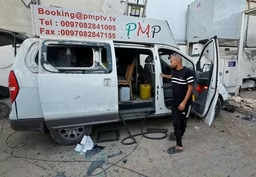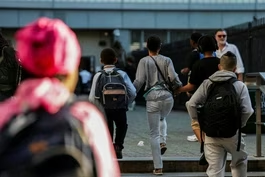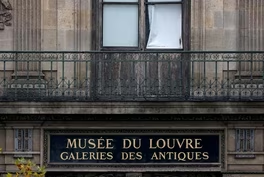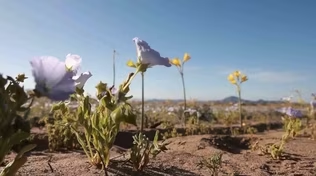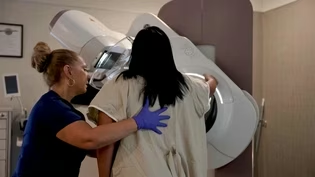
October 19, 2025 - PBS News Weekend full episode
10/19/2025 | 26m 44sVideo has Closed Captions
October 19, 2025 - PBS News Weekend full episode
October 19, 2025 - PBS News Weekend full episode
Problems playing video? | Closed Captioning Feedback
Problems playing video? | Closed Captioning Feedback
Major corporate funding for the PBS News Hour is provided by BDO, BNSF, Consumer Cellular, American Cruise Lines, and Raymond James. Funding for the PBS NewsHour Weekend is provided by...

October 19, 2025 - PBS News Weekend full episode
10/19/2025 | 26m 44sVideo has Closed Captions
October 19, 2025 - PBS News Weekend full episode
Problems playing video? | Closed Captioning Feedback
How to Watch PBS News Hour
PBS News Hour is available to stream on pbs.org and the free PBS App, available on iPhone, Apple TV, Android TV, Android smartphones, Amazon Fire TV, Amazon Fire Tablet, Roku, Samsung Smart TV, and Vizio.
Providing Support for PBS.org
Learn Moreabout PBS online sponsorshipJOHN YANG: Tonight on PBS News Weekend,## the strains on the week old ceasefire# between Israel and Hamas, as Israel## says it launched strikes inside Gaza in# response to Hamas attacks on its troops.
Then, how the Department of Education is spurring# dramatic change in this country's public schools## and a rare fleeting burst of color in# one of the unlikeliest places on Earth.
MAN: The Atacama Desert is the driest in the world# and also one of the territories with the highest## solar radiation.
And the fact that a plant can# grow in these conditions is quite remarkable.
(BREAK) JOHN YANG: Good evening.
I'm John Yang.
Tonight,#there are major strains on the fragile## ceasefire between Hamas and Israel, which# has only been in place for just a little## more than a week.
Israel said it carried out# a series of strikes across Gaza in response## to Hamas attacks on troops near Rafah# on the border with Egypt.
In addition,## Israel says it's cutting off aid# shipments into Gaza until further notice.
One of the Israeli targets was a# seaside coffee shop in Deir Al-Balah## in all Gaza.
Health officials say dozens# of Palestinians were killed.
In Israel,## it is been a bittersweet day, celebrations# as more freed hostages return to their homes## and their families and mourning as# Uriel Baruch was laid to rest.
He## was killed in the October 7 attacks# and his body kept in Gaza until now.
Meanwhile, the remains of two more hostages who## died in captivity were returned, so# they may be given a proper burial.## Special correspondent Leila Molana-Allen is# in Tel Aviv tonight.
Leila, it seems like## this cease fire is running to a lot of problems# rather rapidly this weekend.
What's the latest?
LEILA MOLANA-ALLEN: That's right, John.# And actually there were problems right## from the very beginning.
On Monday, just# the 20 living hostages were released and## only four of the 28 deceased hostages'# bodies were released.
That prompted an## outcry from the families and the# Israeli government said to Hamas,## unless you release it to other bodies# immediately, that is a ceasefire violation.
They started threatening to close the# Rafah Crossing and not let the amount of## aid in that is supposed to be coming in.# What then happened was that, of course,## Hamas hasn't agreed that they are going to# leave the Gaza Strip or they're going to stop## being in charge of it so they reinforced# their presence in the cities and towns.
As the IDF pulled back, they went around# and they started essentially arresting## and did some public executions of# these gangs that they say Israel## has armed to try and fight them and# they want to reestablish their power.
Now there was immediately a comment from President# Trump who said if they're killing people in Gaza,## that violates the ceasefire and# we will go back and kill them.
He## clarified that he did not mean U.S.# troops, but he meant Israeli troops.
Then the next thing that happened was this weekend# we've seen multiple ceasefire violations and both## sides are saying that each side is violating.# Yesterday what happened was there was a bus## that crossed into Gaza City, a family who# were looking to try and find out what had## happened to their home as so many hundreds of# thousands Gazans are returning to their homes.
Now 11 people were killed when# the IDF fired a shell at that bus,## including seven children.
Then in the south in# Rafah, what happened was that the IDF said they## had been attacked by Hamas fighters and that two# soldiers were killed when Hamas fighters fired## anti-tank missile at them.
They responded with# a massive wave of airstrikes that as you said,## has killed dozens of people thus far.# So many violations of both sides.
Where it's been left this evening is# that Israel cats.
The defense minister## has said that they are going to put down# border markers for the yellow line where## the IDF's meant to have pulled back to.
They're# going to reestablish the situation, cease fire,## but anyone crossing that line can be fired upon.
JOHN YANG: Leila, the idea of the ceasefire# was going to give them time to negotiate## the big questions, what Gaza would# look like after the war.
Is there## a chance this could all fall apart and# they never get to those big questions?
LEILA MOLANA-ALLEN: There absolutely is.
And# that was really the problem from the start,## of course, when President Trump was here on# Monday, addressing the Israeli parliament,## he said, this is it, we've ended the war.# It's all over.
Best thing to happen to the## Middle East in decades.
That was really premature.
The fact that President Trump is a deal# guy.
They wanted to push this through.## They wanted to do the initial stage, which# is to stop the killing.
They wanted to stop## people in Gaza dying.
They wanted to get aid# in.
They wanted to start that now.
There has## been a lot behind the scenes where all the# parties involved here, the U.S.
of course,## but also mediators in Egypt and Qatar, they're# trying to keep this deal on the road.
They're## focusing on deconfliction, stopping the bombing,# stopping the shelling and getting the aid in.
But the reality is that the next stage# of this huge Trump 20-point peace plan,## we may never get there.
Nothing else has# been negotiated and the fruits of that## are being born now if we forever stay in# this stage where it's all about stopping## and starting.
Many people are concerned that# this will turn into a Lebanon situation.
It's## been nearly a year since a ceasefire was agreed# with the Lebanon war.
There have been hundreds## of violations documented by the Lebanese# armed forces where Israel has struck both## with airstrikes and shelling Lebanon.
And they# say there has been complete impunity for that.
And they're worried that the same situation# will repeat itself here, where Israel continues## to strike, when they say there's been some sort# of violation, when they say that Hamas has done## something which means will never progress to# the next stage, reconstruction, will they ever## be able to get the materials in?
Where will all# those Gazans live while that's happening?
Will## Israel allow building materials in unless Hamas# is out of power, which they have not agreed to.
And beyond that, a Palestinian state, there are# references to that in this peace plan, but can## that ever happen?
This technocratic committee, is# this just going to be for Gaza?
Is there going to## be something that unites of them all the different# Palestinian territories?
What's the future here?
This is a huge and ambitious plan and# we are languishing in that first stage,## which may not even be able to survive.
JOHN YANG: Leila Molana-Allen in# Tel Aviv, thank you very much.
LEILA MOLANA-ALLEN: Thank you, John.
JOHN YANG: And tonight's other headlines.# There was a brazen daytime .. Louvre Museum today, carried out while# the museum was open to visitors.
The## caper that sounds straight out of a movie# Officials say the thieves used a basket lift,## forced open a window, smashed display cases# of price Napoleonic jewels took eight of them,## made good their escape, all# in less than 10 minutes.
Museum officials see the thieves entered# through an area where construction is underway.## Visitors were steered out of# the museum but weren't told why.
JOAN CARPENTER, American Tourist: We were# just ready to go in to see the Mona Lisa## when they swept us out of the gallery, swept# us down the stairs by the Wing Victory.
Then## were headed out the exit.
We didn't realize# the whole museum was being evacuated and then## we asked a guard and the guard said# we're having technical difficulties.
JOHN YANG: One piece was recovered inside the# museum and will be evaluated for damage.
In June,## Louvre staff staged a walkout saying the museum## was understaffed and that# security was insufficient.
President Trump called Colombian President Gustavo# Petro an illegal drug leader and said he's cutting## U.S.
aid to the country.
In a Truth Social post# today, Mr.
Trump said that if Petro doesn't shut## down drug production that he said is killing# Americans, the U.S.
will close them up for him.
This comes hours after Petro accused the U.S.# government of assassination and demanded answers## for a Thursday U.S.
strike on a Colombian boat in# Caribbean waters.
Shortly after Mr.
Trump's post,## Defense Secretary Pete Hegseth said U.S.
forces# on Friday carried out a strike on another vessel## alleged to be smuggling drugs, killing three.
It# was the seventh known attack since last month.
London police say they are investigating# allegations that Prince Andrew asked a former## bodyguard to dig up damaging information# about the woman who accused him of sexual## assault.
Media reports say that in 2011,# the prince gave Virginia Giuffre's birth## date and Social Security number to a London# police officer.
Giuffre, who took her own## life earlier this year, said the prince# assaulted her when she was 17 years old.
On Friday, Prince Andrew gave up the# royal title Duke of York following years## of controversy over his friendship with# convicted sex offender Jeffrey Epstein.
Still to come on PBS News Weekend, how the# Trump administration is reshaping education## in America and a burst of blooms in# one of the driest places on Earth.
(BREAK) JOHN YANG: In March, President Trump# signed an executive order to begin## shutting down the Department of Education,# though it would take an act of Congress## to actually close it.
In the meantime, the# department is taking dramatic steps toward## fulfilling a conservative vision of a reshaped# system of primary and secondary education.
Jennifer Smith Richards is the co-author of# a ProPublica investigation looking into all## of this.
Jennifer, what is the Department of# Education doing?
What steps are they taking?
JENNIFER SMITH RICHARDS, ProPublica:# Yeah, so they've been very clear## since Trump took office that the idea was# to shut down the department.
Linda McMahon,## the Secretary of Education, has called# it her final mission.
And Donald Trump,## of course, has called the department a# big con job.
So that part has been clear,## this desire to phase out many of the# functions of the department and close it down.
What's been less clear is why# Linda McMahon has brought in## a number of political strategists and, you know,# ultra conservative activists into the office,## even as it's supposed to be shutting down and# winding down.
Those people have been quiet,## frankly, about what they are doing# behind the scenes at the department.
JOHN YANG: Is there a common thread running# between through these appointments?
And are## they all have similar goals or similar things# they've talked about in the past about education?
JENNIFER SMITH RICHARDS: They have.
My colleague# and I at ProPublica went through, you know,## hundreds and hundreds of hours of speeches# and podcast interviews and read essays that## were from these appointees that really lay out# a vision for the future of American education.
And the through line really is# that they want to break up what## they view as a monopoly that public# schools have.
And they envision in## the future that far fewer students# will be attending a public school.
JOHN YANG: I've heard people talk about# this, and it's all in the view of the## idea of returning power to the parents,# letting them sort of figure out what schools## are doing well and let them send the money# there.
What do the critics say about this?
JENNIFER SMITH RICHARDS: Well, critics say# you need a strong public school system for## many reasons.
One is that public schools are# required to serve students with disabilities,## whereas private schools typically are not.
You# know, the American school system is a democratic## idea.
It was designed to serve any and all# students who come through their doors.
And private## school choice means that private schools also get# to choose which students they're going to accept.
JOHN YANG: On the one hand, the administration# and conservatives say that most decisions about## what happens in school should be done at the# state and local level.
But are they talking## about getting involved at the federal# level about some curriculum decisions?
JENNIFER SMITH RICHARDS: Federal government# historically has not been involved in dictating## what is being taught in the classrooms.
They've# not been in the curriculum business.
But what## we're seeing under this administration is a# desire to promote certain types of curriculum,## for example, what they refer to as a# pro America or patriotic curriculum## that would be in public schools across America.
We've also seen a number of edicts and# mandates come out of the department## that have to do with teaching racism and gender# and diversity issues.
Those are steps into the## classroom that we haven't seen very frequently# in the last few years.
We really are seeing## the federal government start to really reach into# classrooms in a way that we are not familiar with.
JOHN YANG: There have been some states# have tried to do this, haven't there?
JENNIFER SMITH RICHARDS: There have been some of# the states that tend to have majority Republican## legislatures have advanced several bills# that you might have heard of as anti-DEI## bills or anti-CRT bills.
A number of states# have passed anti transgender bathroom bills.
So some of these, you know, reforms# have been tested individual states## and have been upheld by courts so far in many# of the states.
So, yes, there is certainly a red## state testing ground for many of these ideas that# we're seeing play out now at the federal level.
JOHN YANG: And how have the results been, these# testing grounds?
What have been the results?
JENNIFER SMITH RICHARDS: I can't say for# sure in every state, but there have been## states where the testing grounds have really# held up.
So states have been able to adopt## laws that restrict pretty severely teaching# about racism and teaching about gender.
They## have been successful in passing bathroom# bills that prevent transgender students## from using the bathroom or locker room at# school that matches their gender identity.
Those have been in place.
And a# number of states have been pretty## successful in limiting just the# type of material that can be at a## school or in a school library or on a# teacher's bookshelf in her classroom.
And so we're seeing kind of a copying# of that at the federal level now,## where we're hearing for the first time, at least# in many years from the federal government that## they want to push certain types of curriculum# and certain types of teaching into classrooms.
JOHN YANG: Jennifer Smith Richards# of ProPublica, thank you very much.
JENNIFER SMITH RICHARDS: Thank you.
JOHN YANG: The end of breast cancer# treatment is cause for celebration,## but for many patients, it can bring new# challenges.
They can include lymphedema,## painful swelling of tissue# due to excess fluid retention.## Some studies show up to 65 percent of women who# undergo breast cancer surgery develop lymphedema.
Ali Rogin spoke with two members of the nonprofit# Lymphedema Education and Research Network, Dr.## Stanley Rockson of Stanford Medicine, and retired# Army Colonel Susan Fondy, who's also a physician.
ALI ROGIN: Thank you both so# much for being here.
Dr.
Rockson,## let's start with you.
Why is lymphedema# so common among breast cancer patients?
DR.
STANLEY ROCKSON, Stanford Medicine:# Lymphedema occurs because the lymphatic## system has been damaged.
And systematically# we have to do that, both to determine the## appropriate treatment for breast cancer and to# curtail the cancer.
So lymph nodes are removed,## but that creates damage.
80, 85 percent of the# time, that damage can be accommodated by the body,## but 15 percent of the time, it results in# malfunction, and that's what we call lymphedema.
And because breast cancer is so common# among women in the United States,## the numbers of people affected, even if it's# only 15 percent will be relatively large.
ALI ROGIN: Colonel Fondy, you were diagnosed# with stage three breast cancer and developed## lymphedema following your treatment.
But as a# physician yourself, when you were going in for## consultation, you asked questions about your# risk.
What did doctors at the time tell you?
COL.
SUSAN FONDY (RET.
), Army: When I# was first diagnosed with breast cancer,## the surgeon saw me, and he talked to# me about the possible treatment options## as far as surgery went, but he never mentioned# lymphedema.
And then he reached for the doorknob,## and he turned back and asked# me if I had any questions.
And I said, what about lymphedema?
And# he said, what about it?
And I was kind## of surprised.
I just sort of stammered,# I don't want to get it.
And he said,## you won't.
You're small.
And he# was mistaken and misinformed.
The only risk factor that I did not# have for lymphedema was obesity,## but I had all of the other risk factors,# and he was just not educated in that.
And## he didn't know what to do about it,# so he didn't want to talk about it.
ALI ROGIN: When I was first diagnosed, I was given# a lymphedema compression sleeve.
Very quickly,## my hand swelled up, and then I was# given a glove as well.
I have worn## compression sleeves and gloves day and# night for more than 10 years.
I pursued## a surgical option in 2016 and it didn't# help.
I pursued another surgical option## about a year ago and that I've seen# some big improvement from Dr.
Rockson.
ALI ROGIN: How common is it for doctors who# treat breast cancer to not have a tremendous## awareness of the potential for and# treatment options for lymphedema?
STANLEY ROCKSON: It's unfortunately# very common.
The situation is improving,## but not rapidly enough.
I did a study# back in 2004 to determine what amount## of time is spent in a medical school# education on the lymphatic system in## total and learned that on average it's 15# to 30 minutes out of a four year education.
So there's not really enough time to properly# educate clinicians on the diagnosis and## treatment of even a common disorder of# the lymphatic system if it's not studied.
ALI ROGIN: And Dr.
Rockson, walk us through# the spectrum of efforts and options to both## prevent getting lymphedema and then also# mitigating it once it's been detected.
STANLEY ROCKSON: The most important preventive# strategy, of course, is minimizing the number of## lymph nodes that need to be surgically excised.# And there has been a movement over the last 20## years progressively to accommodate that need.# Radiation protocols have also been curtailed in## such a way as to minimize lymphatic damage.
Then# we need surveillance and in well informed centers.
This occurs on a quarterly basis over# the next 24 months at a minimum.
And## if we undertake aggressive treatment at that# point, we can actually prevent lymphedema in## about 50 percent of cases.
Once the lymphedema# occurs, then there is a very standard protocol## for physical interventions to minimize the# amount of edema that has developed during## that period of time and then a maintenance# regimen that includes compression garments## and devices and other approaches to# try to maintain that benefit over time.
ALI ROGIN: Colonel Fondy, I'd like to# ask you about what it's like living## with this condition.
You recently# retired as an army flight surgeon,## but how did it affect both your# military career and your everyday life?
SUSAN FONDY: It's something that causes you to# not be able to ever be done with cancer.
I have## this thing that I look at or I have to manage# every minute of every day.
And in the military,## it was particularly bothersome, both because I# wasn't able to do some of the things I needed## to be able to do, but also because every# time I shook hands with somebody or saluted,## my lymphedema was front and center,# so I couldn't step beyond it.
ALI ROGIN: And Colonel Fondy, you have been# advocating on Capitol Hill in support of## federal funding for lymphedema research.# What is the state of those efforts?
SUSAN FONDY: In 2023, lymphedema# and lymphatic diseases were added## to a list of diseases that receive federal# funding for basic research.
This past year,## lymphedema and lymphatic diseases were dropped# entirely from the list, and nobody knows why.
So we've been advocating on Capitol Hill# to get lymphatic diseases added back to## that list of diseases that can compete for that# funding.
This is critically important because our## lymphatic researchers, they have not been able# to do the amount of research that is needed.
What we need on Capitol Hill is we need# one of the senators to be a hero.
We## need them to step up and add lymphatic# diseases back to that list of diseases## so our researchers can continue doing# research for this very prevalent disease.
ALI ROGIN: Dr.
Stanley Rockson,# Colonel and Dr.
Susan Fondy,## thank you both so much for joining me.
SUSAN FONDY: Thank you so much.
STANLEY ROCKSON: Thank you.
JOHN YANG: We leave you tonight with# a beautiful sight in an unexpected## place.
William Brangham tells us about it.
WILLIAM BRANGHAM (voice-over): These wildflowers,# gently blowing in the breeze are delicate and rare## because they live in one of# the driest places on Earth,## a place usually hostile to# any kind of flowering plant.
This is the Atacama Desert, a sprawling stretch# of land squeezed between the Pacific Ocean and the## Andes Mountains, mostly in Chile.
It normally# gets just 2 millimeters of rain every year,## but this July and August, some parts of# the desert got 60 millimeters of rain.
But rain isn't the only condition needed# for this landscape to be transformed,## says Victor Ardiles, the head of botany# at Chile's Museum of Natural History.
VICTOR ARDILES, Museum of Natural History,# Chile (through translator): We understand## that there is a thre.. to activate.
But in addition to water# or precipitation, we need temperature,## we need a certain number of hours of# daylight, and we also need humidity.
WILLIAM BRANGHAM (voice-over): This year,# those proverbial stars aligned and the blooms## are bursting.
Ariel Orellana studies plant# biotechnology at the Andres Bello University.
ARIEL ORELLANA, Andres Bello University (through# translator): The Atacama Desert is the driest in## the world and also one of the territories with the# highest solar radiation and ultraviolet radiatio.. on the planet.
This means there are very adverse# conditions for the growth of any living being.
And the fact that a plant can grow in these# conditions is quite remarkable.
We wanted to## investigate it and understand the mechanisms it# uses to survive in such a hostile environment.
WILLIAM BRANGHAM (voice-over): This# floral display has drawn tourists## and scientists for the opportunity to# understand just how these plants do it.
CESAR PIZARRO GACITUA, National Forest# Corporation, Chile (through translator):## Coordination and joint work with# academics and researchers studying## the physiology of this plant is very# important.
How can it produce enough## food and perform photosynthesis# to withstand extreme conditions?
WILLIAM BRANGHAM (through# translator): Orellana says## understanding these individual plants# is k.. ARIEL ORELLENA (through translator):## This plant has the ability tolerate drought very# well, which is a serious and growin.. global agriculture.
Therefore, by understanding# the genome, the genetic information of this plant,## and at the same time identifying which genes# are expressed when it is exposed to drought,## we could potentially use that knowledge to# develop crops with greater drought tolerance.
WILLIAM BRANGHAM (voice-over): Most of these# flowers will disappear by November as South## America edges closer to its summer season.# For PBS News Weekend, I'm William Brangham.
JOHN YANG: And that is PBS News Weekend# for this Sunday.
I'm John Yang.
For all## of my colleagues, thanks for# joining us.
Have a good week.
Ceasefire violations strain fragile Israel-Hamas truce
Video has Closed Captions
Clip: 10/19/2025 | 5m 14s | Ceasefire violations in Gaza strain fragile truce between Israel and Hamas (5m 14s)
How the Trump administration is reshaping U.S. education
Video has Closed Captions
Clip: 10/19/2025 | 5m 32s | How the Trump administration is dramatically reshaping education in America (5m 32s)
News Wrap: Thieves steal priceless jewels from Louvre Museum
Video has Closed Captions
Clip: 10/19/2025 | 2m 44s | News Wrap: Thieves steal priceless jewels from Louvre Museum (2m 44s)
Scientists study rare bloom in the Atacama Desert
Video has Closed Captions
Clip: 10/19/2025 | 3m | Scientists study rare bloom in the Atacama Desert, one of the driest places on Earth (3m)
What to know about lymphedema after breast cancer treatment
Video has Closed Captions
Clip: 10/19/2025 | 7m 2s | What to know about lymphedema, a painful side effect of breast cancer treatment (7m 2s)
Providing Support for PBS.org
Learn Moreabout PBS online sponsorship
- News and Public Affairs

FRONTLINE is investigative journalism that questions, explains and changes our world.

- News and Public Affairs

Amanpour and Company features conversations with leaders and decision makers.












Support for PBS provided by:
Major corporate funding for the PBS News Hour is provided by BDO, BNSF, Consumer Cellular, American Cruise Lines, and Raymond James. Funding for the PBS NewsHour Weekend is provided by...
